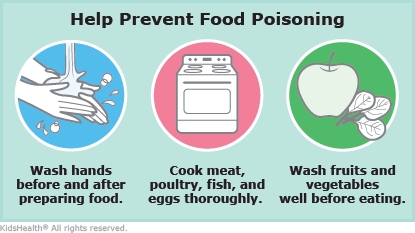Food Poisoning: How to Care for Your Child
Food poisoning is when someone gets sick from eating food that contains germs. Most of the time, food poisoning goes away on its own in a day or two.


-
Give your child any prescribed medicine as directed by the health care provider.
-
Don't give over-the-counter anti-diarrhea medicines. These medicines can make food poisoning symptoms worse.
-
Let your child rest as needed.
-
Offer your child lots of liquids, such as water or pediatric electrolyte solutions (such as Pedialyte®, Gerber® Replenish™ or a store brand). Have your child take small, frequent sips.
-
If you are breastfeeding, you may continue. Your child may want to nurse more often, but for shorter times.
-
Don't give fruit juices or high-sugar drinks (such as sports drinks) because they can make diarrhea worse.
-
Offer bland, low-fat foods (like rice, potatoes, bread, lean meats, yogurt, fruits and vegetables) in small amounts. Don't force it if your child doesn't want to eat.

Your child has:
-
diarrhea that lasts longer than 2 days
-
vomiting that lasts for more than 12 hours
-
a new fever, or a fever that lasts more than 2 days
-
a rash
-
blood in poop
-
blood in vomit (throw up)
-
seems dehydrated; signs include dizziness, extreme thirst, a dry or sticky mouth, sunken eyes, peeing less than usual, crying with little or no tears.


How do germs get into food? Germs (such as bacteria, viruses or parasites) can get into food in different ways, including when:
-
Germs from animal or human poop get into the water used to grow food.
-
Meat or poultry touches germs during processing or shipping.
-
Cooks or other food handlers don't wash their hands or don't use clean utensils or cutting boards.
-
Food is stored at the wrong temperature or kept too long.
When do symptoms start after someone eats contaminated food? Food poisoning symptoms might start a few hours after someone eats infected food. But sometimes, a person doesn't feel sick until days or even weeks later.
How can we prevent food poisoning? To help prevent food poisoning:
-
Wash hands with soap and warm water (scrub well for 15 seconds):
-
Cook meat, poultry, fish and eggs thoroughly.
-
Wash cutting boards and utensils thoroughly with soap and warm water (or use a dishwasher) after preparing raw meat, fish, poultry or eggs.
-
Keep raw meat, poultry, fish (or their juices) and eggs away from other foods.
-
Wash fruits and vegetables well before eating.
-
Do not let cooked foods or foods that need to stay cold (such as milk or uncooked meat) stay out at room temperature for more than 2 hours (1 hour if the room temperature is above 90ºF [32.2ºC]).
-
Do not give honey to babies younger than 1 year old.
-
Make sure that your child's immunizations are up to date.